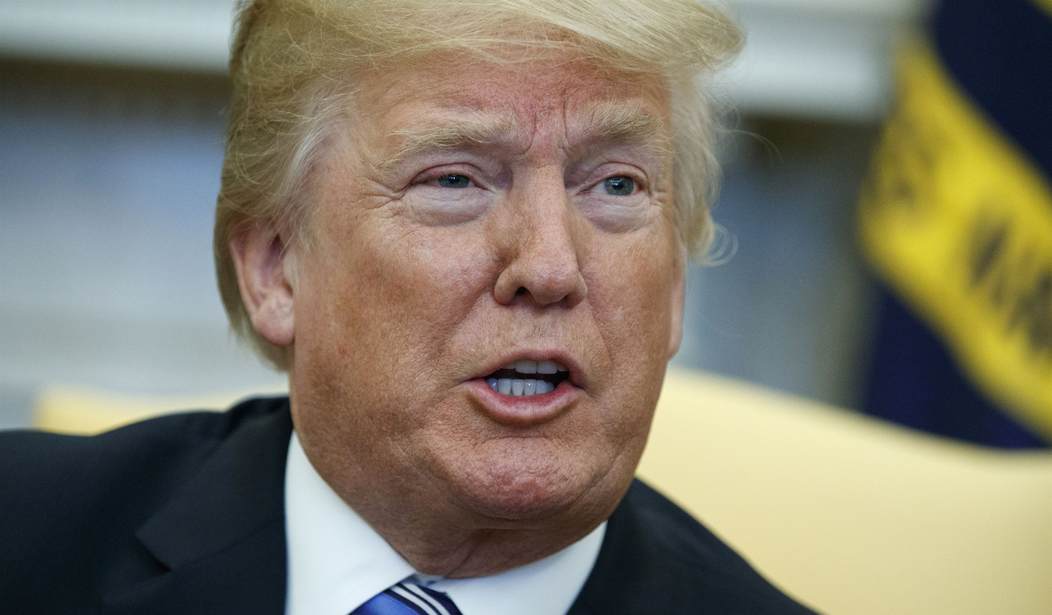Donald Trump's announcement that he is imposing tariffs on steel and aluminum imports from other countries has aroused little enthusiasm and much criticism. It evidently prompted the resignation of Gary Cohn as head of his National Economic Council.
It has also prompted free trade-minded Republicans in Congress to propose repealing Section 232 of the Trade Expansion Act of 1962, which delegates to the president the power to adjust trade restrictions and impose tariffs.
It's not clear exactly what trade restrictions Trump is poised to impose or whether negotiations with Mexico and Canada will end the North American Free Trade Agreement. One possibility is that the self-styled master of the art of the deal is using steel and aluminum as leverage to get Canada to agree to his terms on NAFTA.
Trump's move is widely depicted as a departure from the free trade policies pursued by every administration since World War II. But a perusal of Dartmouth economist Douglas Irwin's history of American trade policy, "Clashing Over Commerce," reveals that his move is not all that different from what other postwar presidents have done -- and that free traders might be sorry if Congress actually were to repeal Section 232.
Tariffs, it is often said, have been one of the bases of American economic policy since the days of today's Broadway musical hero Alexander Hamilton. That's an exaggeration, argues Irwin, but they were the major revenue source for the early republic's pint-size federal government.
Recommended
Irwin's second major point is that tariffs haven't been changed very often. A rise in tariffs rankled Southern cotton producers in the 1820s, and South Carolina's John C. Calhoun, the then-vice president, penned an argument that states could nullify federal laws. President Andrew Jackson sent troops to the state's borders, and the state backed down, at which point Jackson and Congress lowered tariffs.
Trade became a partisan issue, so, Irwin points out, significant tariff changes happened only when one party held the presidency, the Senate and the House -- a rarity then as now. Democrats lowered rates in 1846; Republicans raised them in 1862, during the Civil War; Democrats lowered them in 1913; Republicans raised them in 1922. In 1930, a Republican Congress took 18 months -- with 527 hours of Senate debate on some 1,253 amendments -- to pass the notorious Smoot-Hawley Tariff Act, which President Herbert Hoover enacted over a protest signed by 1,028 economists.
The Great Depression, which followed (but, says Irwin, wasn't caused by) Smoot-Hawley, opened the way for a changed policy. Franklin Roosevelt's first secretary of state, Cordell Hull, a fervent free trader, was often bypassed on foreign policy but was given full leeway in fashioning the Reciprocal Trade Agreements Act of 1934. This gave the president -- in practice, Hull's State Department -- authority to negotiate reciprocal tariff reductions with foreign countries. Tariffs fell from 30 percent of imports in 1900 to 5 percent in 1945 and 1.5 percent recently. On trade, Hull was one of the most successful policymakers in American history.
Trade acts in 1962 and 1974 made Hull's reforms permanent. Section 232 also left presidents with the power to raise tariffs, which free trader Republicans are complaining about today. Trump is not the first president to use this power.
Ronald Reagan, a free trader from his days as a Democrat, facing mass closure of steel and auto plants, negotiated voluntary restraint agreements with the European Economic Community, as well as surge controls limiting steel imports from particular countries and voluntary export restraints limiting Japanese auto exports. George W. Bush imposed higher duties on steel imports in 2002.
These measures were intended to be -- and were -- temporary. Producers adjusted. Foreign-based auto companies built American plants, evading domestic content requirements and import limits. American steel producers eventually adopted high-productivity processes developed by Europeans decades before.
American trade policy over the past several decades, as Irwin describes it, has been one in which Smoot-Hawley-type tariffs are irrelevant and in which complex, low-visibility negotiations between executive branch agencies and foreign nations respond to grievances of American interests. High-visibility complex free trade agreements -- notably, NAFTA (1993) and most favored nation status for China (2000) -- have also passed Congress, with most Republicans in favor and Democrats increasingly opposed.
Trump developed his views on trade in the 1980s, when Reagan was fending off protectionist pressures with temporary expedients. It's unclear whether Trump really hopes to re-create the 1970s steel industry (he won't) or whether he's seeking leverage in negotiations with trading partners as other presidents have.
A dicey process, perhaps, but surely better than the Smoot-Hawley days, when Congress voted on thousands of amendments.

























Join the conversation as a VIP Member